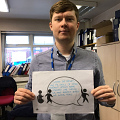What research can I access at Manchester Vascular Centre?
When I joined the Research Team at Manchester Vascular Centre in January 2016 as a Clinical Trials Coordinator, it soon became apparent the scope of the work performed by the team there.
The surgeons operate on all manner of blood vessels throughout the body, treating many symptoms and providing therapy for a number of conditions. As such, the aim of the team is to reflect the unique range of services offered to our patients with the research that we carry out.
Our ultimate aim is to offer patients with any vascular condition the chance to participate in a research study or clinical trial that will directly benefit them. It is part of CMFT’s vision as a Trust to provide patients with the best experience possible when accessing healthcare, and research is one of the most important ways in which we can realise this. Last year was a great success for the Manchester Vascular Centre Research Team. 39 patients were recruited to a number of different studies. Already in the first quarter of 2017, we have recruited 30 patients to our studies, so we are on course for an even more successful year.
What are the types of research we do?
To explain the types of research the unit conducts I have listed each of the consultant vascular surgeons specific research interests:
Mr J Vince Smyth: Carotid Artery Research
Mr Tawqeer Rashid: Lower Limb Research
Mr David Murray: Aortic Research
Professor Ferdinand Serracino-Inglott: Infection Control Research
Mr Naseer Ahmad: Lower Limb Research/Epidemiology
Mr Frank Bowling: Diabetic Foot Research
Manchester Vascular Centre is leading the way in all fields of research, especially in terms of new medical devices. The RECELL study has enabled patients to access a brand new treatment, in the form of an innovative spray-on skin system, for diabetic foot ulcers. Other treatments have not worked for these patients and without this new treatment option; many patients would have continued to suffer. When treated with the RECELL device, the ulcers have started to heal. By proving the effectiveness of this treatment and demonstrating its worth to patients, we hope that more people will be able to access RECELL.
Nothing stands still in medicine, questions are constantly being asked, and new products are constantly in development. The VOYAGER study takes a relatively new medicine, Rivaroxaban, and asks if patients who have recently had an operation on the blood vessels in their legs will benefit from taking it. We already know that this medicine reduces the risk of stroke, helps to restore abnormal heart rhythms and successfully thins blood that is overly thick and prone to clotting. We at Manchester Vascular Centre want to know if it can help our patients too, which is why we give our patients the chance to help us answer this important question.
How can I find out more?
If you are a patient ask your consultant, your vascular specialist nurse or even a member of the research team directly. We try to be as visible as possible around the Trust to make it easier for patients to get involved.
If you are a healthcare professional who would like to refer a patient on to a study, please speak to a member of our research team.
The number of studies that we are committed to is always increasing, so if there is a particular condition that you would like to see if we have a study for, then please do get in touch.
Questions that we look to answer with our research in the near future are:
- Can we fix an aneurysm as a day-case outpatient procedure instead of a major operation?
- Is there a better product to stop bleeding during surgery?
- What is the most successful way to angioplasty a blocked blood vessel in the leg?
Find out more
Find out more about the Manchester Vascular Centre’s rapidly expanding research portfolio




